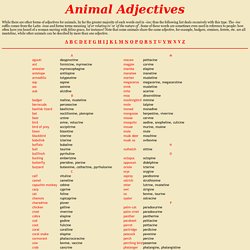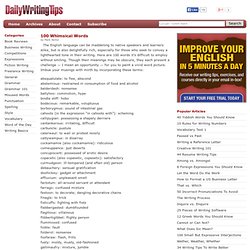

Spelling Match Game. "Phrases in English" - Home Page.
Lexipedia - Where words have meaning. Interesting and Unusual Words. 100 Exquisite Adjectives. By Mark Nichol Adjectives — descriptive words that modify nouns — often come under fire for their cluttering quality, but often it’s quality, not quantity, that is the issue.

Plenty of tired adjectives are available to spoil a good sentence, but when you find just the right word for the job, enrichment ensues. Animal Adjectives. Animal Adjectives While there are other forms of adjectives for animals, by far the greater majority of such words end in -ine; thus the following list deals excusively with this type.

The -ine suffix comes from the Latin -inus and forms terms meaning 'of or relating to' or 'of the nature of'. Some of these words are sometimes even used in reference to people: how often have you heard of a woman moving with feline grace, for instance? Note that some animals share the same adjective, for example, badgers, ermines, ferrets, etc. are all musteline, while other animals can be descibed by more than one adjective. Home ~ The Stories ~ Diversions ~ Links ~ Contact. Synonyms.
100 Words Every Expert Author Should Know. Please note: Read this post first.

We clarified our position. A Great Vocabulary Makes Compelling Reading! The EzineArticles Editors have compiled a list of 100 words they recommend every Expert Author should know to be more concise, descriptive, and engaging. Show you’re a master of the English language by spicing up your writing with the following words and feel free to share this graphic.
Simply click on the graphic below to view in a new window and then click the image or select Ctrl (on your keyboard) and then + or – to zoom in or out. By no means is this an exhaustive list. Want to share this image? Synonym Finder » Find synonyms, antonyms & definition for (almost) any word. Word Information - an English dictionary about English vocabulary words and etymologies derived primarily from Latin and Greek word origins. 100 Mostly Small But Expressive Interjections. David Bier Thanks for this – what a fun post considering there’s no actual narrative in it!

Cecily Some of these interjections are quite culturally and age specific, so if people need to be told what they mean, they should probably not be using them.For example, to many Brits, va-va-voom is not old-fashioned at all, but instead is firmly linked to the long-running ads that footballer Thierry Henry made for the Renault Clio. Himanshu Chanda Whoa ! What a biiiig list. And yes this ones really great. You understand exact meaning of those interjections while reading comic strips Michael Huzzah! UCLE: Some significant numbers from literature and literary criticism. 45 ways to avoid using the word 'very'.
Writers Write is your one-stop resource for writers.

Use these 45 ways to avoid using the word ‘very’ to improve your writing. Good writers avoid peppering their writing with qualifiers like ‘very’ and ‘really’. They are known as padding or filler words and generally add little to your writing. According to Collins Dictionary: ‘Padding is unnecessary words or information used to make a piece of writing or a speech longer. Synonyms include: waffle, hot air, verbiage, wordiness.’ 10 Everyday Words With Unexpected Origins. Books Etymology, or the study of the origin of words, is dry, dusty stuff that will give you allergies if you play with it too long.

It also happens to be one of our favorite topics—because sometimes a word travels through such a twisted path to get to its modern meaning that all you can do is scratch your head and wonder how civilization manages to keep itself going. Read on to find out what word got its start with people biting the heads off chickens, how a peaceful word became an international symbol of hate, and how wooden shoes changed the world. 13 Wonderful Old English Words We Should Still Be Using Today. As the years pass, language evolves.

Since the days of Chaucer and Shakespeare, we can all agree English has become less flowery. Some fantastic vocabulary just dropped out of everyday conversation. Author Mark Forsyth writes about the words we’ve lost. Eat. Live. Laugh. and sometimes shop!: 50 most beautiful English words. A few weeks ago I ran across a list, which I shared with you, of 33 Ways to Stay Creative.

One suggestion was to read a page in the dictionary. Reverse Dictionary. Steven Pinker: Linguistics as a Window to Understanding the Brain. 100 Whimsical Words. By Mark Nichol The English language can be maddening to native speakers and learners alike, but is also delightfully rich, especially for those who seek to convey a lighthearted tone in their writing.

10 Words That Don't Mean What You May Think They Do. By Mark Nichol As English evolves, word meanings shift and turn, sometimes reversing themselves altogether.

These ten words have shifted their senses over the years. In some cases, we are wise to likewise be flexible; in others, we relax our vocabulary at the expense of useful distinctions: 1. Hidden Cues That Sway You. Words, words, words. 10 Words That Don't Mean What You May Think They Do. The Science of Sarcasm? Yeah, Right. The Dictionary of Obscure Sorrows. Weird Words Index. 100 Beautiful and Ugly Words. The Mind is a Metaphor: As It Were. As It Were · 2006-09-27 by Brad Pasanek Must we mean what we say? In the case of metaphor, meaning is underspecified, patently false, or—according to some theorists—somehow transmuted. Somehow changed. Words must mean just what they mean.1 But what of speakers?
Imagine A Flying Pig: How Words Take Shape In The Brain : Shots - Health News. Hide captionAlthough a flying pig doesn't exist in the real world, our brains use what we know about pigs and birds — and superheroes — to create one in our mind's eye when we hear or read those words. iStockphoto.com Although a flying pig doesn't exist in the real world, our brains use what we know about pigs and birds — and superheroes — to create one in our mind's eye when we hear or read those words.
This is a story about a duck. More precisely, it's a story about what your brain just did when you read the word "duck. " Chances are, your brain created an image of a web-footed waterfowl. Just a few decades ago, many linguists thought the human brain had evolved a special module for language. But in the 1990s, scientists began testing the language-module theory using "functional" MRI technology that let them watch the brain respond to words.
The Idiom Connection. 100 Exquisite Adjectives. A Brief Guide to Embodied Cognition: Why You Are Not Your Brain. Embodied cognition, the idea that the mind is not only connected to the body but that the body influences the mind, is one of the more counter-intuitive ideas in cognitive science. In sharp contrast is dualism, a theory of mind famously put forth by Rene Descartes in the 17th century when he claimed that “there is a great difference between mind and body, inasmuch as body is by nature always divisible, and the mind is entirely indivisible... the mind or soul of man is entirely different from the body.” In the proceeding centuries, the notion of the disembodied mind flourished. From it, western thought developed two basic ideas: reason is disembodied because the mind is disembodied and reason is transcendent and universal. If You've Never Used These English Idioms, You're Probably Not a Native Engli...
Those of us who grew up with English as our first language have been exposed to idioms and idiomatic expressions for most of our lives. They may have confused us a little when we were children, but explanation and constant exposure not only increased our understanding of them, but likely drew them into our own vernacular.
If you’re in the process of learning the English language, you may come across some of these and not be entirely sure what they mean. Here’s a list of 20 that you’re likely to come across fairly often: 1. Idioms – as clear as mud? Miranda Steel is a freelance ELT lexicographer and editor. She has worked as a Senior Editor for dictionaries for learners at OUP and has also worked for COBUILD. In this post, she looks at some of the weird and wonderful idioms in the English language. Idioms are commonly used in spoken and written English.
Words and phrases: frequency, genres, collocates, concordances, synonyms, and... 100 Exquisite Adjectives. Word Spy. - StumbleUpon. 104 POWER VERBS. Careful, writers! 10 common words with opposite meanings. The English language is full of words with uncommon properties. 25 Common Phrases That You're Saying Wrong. Being a freelance writer, I often find myself messing up common phrases. When I’m unsure, I do a quick Google search to make sure that what I’m writing is actually what I’m trying to say. The Phrontistery: Obscure Words and Vocabulary Resources. Cliche Finder. Slang Search. Online Dictionary, Language Guide, Foreign Language and Etymology.
Phrase Thesaurus - ideas generator for writers. IdiomSite.com - Find out the meanings of common sayings. 100 Little Ways You Can Dramatically Improve Your Writing. Free English idioms, idiomatic expressions, proverbs and sayings. Using Social Media to Land New Writing Gigs.
Writing. 11 Untranslatable Words From Other Cultures. 5 Ways to Deal with Word Repetition.